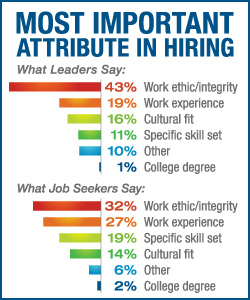 Earlier this year, Inc. Magazine reported that 86% of employees plan to search for a new job in 2013. Maybe you’re in that 86% majority. Or maybe you’re in the 14% who aren’t actively seeking other employment but wondering if you should be. Either way, before you commit your time and energy to a new job hunt, you need to know if it’s the right time for a change.
Earlier this year, Inc. Magazine reported that 86% of employees plan to search for a new job in 2013. Maybe you’re in that 86% majority. Or maybe you’re in the 14% who aren’t actively seeking other employment but wondering if you should be. Either way, before you commit your time and energy to a new job hunt, you need to know if it’s the right time for a change.
Any time you change employers, there are a lot of factors involved. Changing jobs means you’re entering into a brand new environment with new people, new expectations, rules, responsibilities, and a new culture. You’ll want to make sure you’re leaving your current job for the right reasons.
You’re Ready for Career Growth
When it comes to your career, you should be in the driver’s seat, so it’s important to know when you’re on the right path and when you’ve taken a detour. If your desire is to move up into a management position and you feel you’re ready to go to the next level, try having a conversation with your current manager or boss and let them know your goals. Remember, communication is key. Before leaving any company it’s important to understand your options. If you are unhappy and stressed out all the time maybe some things need to change. Don’t mistake being stressed out for being burned out. Here are a few scenarios to help you determine the difference. If you find there is no room for growth, it may be time to find something new. As you’re looking, just remember to continue to find ways to grow your knowledge and skills no matter where you are. The same goes for when you want new responsibilities, to move into another area of work, or receive a fair compensation increase. Always be sure you’ve communicated with your employer about your desire, and not just assumed something’s not possible.
You’re Experiencing Toxic Relationships
The people you work with every day can make or break a job. No matter where you work, there may be conflict from time to time, so you shouldn’t decide to leave just because you don’t get along with someone. But, if the overall attitudes of your coworkers are negative, or you have a bad boss, it may be time to consider moving on. Relationships play a big role in how engaged, fulfilled, and happy you are in your workplace.
You Don’t Feel It’s a Good Culture Fit
How you mesh with your employer’s culture, including their values, work pace, and expectations, is another important factor in charting your career plan. If you’re finding yourself constantly at odds or frustrated with your company, ask yourself a question. Have you changed, has the employer changed, or has it always been this way? If something has changed recently, like a shift in what you value in an employer or a change in direction from corporate leadership, then you need to weigh the pros and cons of leaving. If nothing’s changed, and you came on board with the company knowing about your differences, then try thinking back and remembering why you took the job in the first place. This will help you make the best decision, whatever it may be.
Changing jobs can be exciting, rewarding, and a great step for your career, but breaking up with your employer isn’t something to be taken lightly. You should always check your motives. If you’re sure that you’re doing the right thing, go ahead. Just remember to not burn any bridges along the way because you never know where they can lead, stay classy.
How did you know it was time to change jobs? Share your story below.






